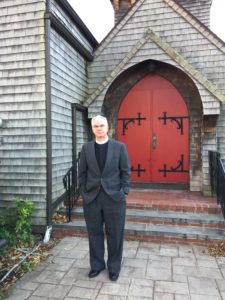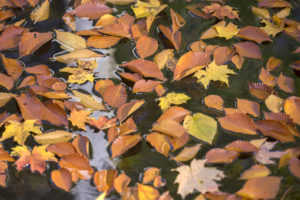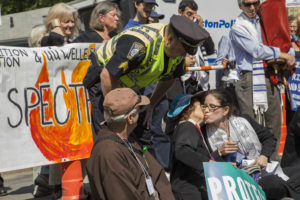Delivered by the Rev. Dr. Margaret Bullitt-Jonas at St. John’s Episcopal Church, Sandwich, MA
Wisdom of Solomon 3:1-9
Psalm 24
Revelation 21:1-6a
John 11: 32-44
All Saints: On being good ancestors
Back in 1982, Alice Walker wrote a marvelous novel, The Color Purple. Maybe you remember it. It was greeted with critical acclaim, won a Pulitzer, and was eventually made into a movie. What interests me today is that soon after writing The Color Purple, Alice Walker began to dream about her ancestors. Some of these dream-visits were from people she had known before they died. Others were from people who had lived and died before she was born. People she knew nothing about began to visit her in her dreams. One night, she says, “a long line of ancestors… all apparently slaves, field workers, and domestics,” came to visit her, each one bringing some wisdom or words of support, or sometimes just a hug. When she woke up the next morning, Alice Walker could still feel the plump hand of one of these visitors, “a dark, heavy-set woman who worked in the fields,” gently but firmly holding her own. Alice Walker goes on to say, “I get to keep these dreams for what they mean to me, and I can tell you that I wake up smiling, or crying happily… It seems very simple: Because they know I love them and understand their language, the old ones speak to me… I feel that [this dream is] not so much my dream as ours [and in it I feel sustained forever]… Since this dream I have come to believe that only if I am banned from the presence of the ancestors will I know true grief.”1

We are living in difficult times, and it’s good to bring our ancestors to mind and to draw strength from what the Bible calls the great “cloud of witnesses” (Hebrews 12:1) that surrounds us. In fact, I’m going to invite us right now to grab hold of our ancestors’ hands, because we need to take a look at some hard truths about the health of our planet, Mother Earth. Scientists are telling us with increasing alarm that the web of life is breaking apart and that human civilization is at risk. I’ll say a quick word about two great challenges: vanishing wildlife and climate change.
In a major report that was released this week, World Wildlife Fund concludes that humans have “wiped out 60% of mammals, birds, fish and reptiles since 1970, leading the world’s foremost experts to warn that the annihilation of wildlife is now an emergency that threatens civilization.” According to this new study, “the vast and growing" "consumption of food and resources by the global population is destroying the web of life, billions of years in the making, upon which human society ultimately depends for clean air, water and everything else.”
An executive at World Wildlife Fund, Mike Barrett, is quoted as saying: “We are sleepwalking towards the edge of a cliff…If there was a 60% decline in the human population, that would be equivalent to emptying North America, South America, Africa, Europe, China and Oceania. That is the scale of what we have done… This is far more than just being about losing the wonders of nature, desperately sad though that is…This is actually now jeopardizing the future of people. Nature is not a ‘nice to have’ – it is our life-support system.”
As for climate change, you’re probably aware that last month the U.N.’s Intergovernmental Panel on Climate Change released a major report about what it will take to keep the earth’s temperature below 1.5 degree Celsius of warming. That’s the level that countries around the world decided is a reasonably safe upper limit for maintaining life as we know it on this planet, though the IPCC warned that even 1.5 degrees of warming “is likely to be disastrous, with consequences that include… the loss of most of the world’s coral reefs, the displacement of millions of people by sea-level rise, and a decline in global crop yields.” Is it possible to hold global warming within that 1.5 degree Celsius rise? Maybe, but we will need to make an extraordinary collective effort worldwide. The only way to avoid hurtling past that threshold is to carry out a radical transformation of human civilization at a scale that has never happened before, and do this breathtakingly fast: the world has perhaps just ten or twelve years in which to prevent climate catastrophe.

We were born for such a time because we put our faith and trust in a God who creates and loves every inch of creation, who calls it good (Genesis 1:1-31), and who entrusts it to our care (Genesis 2:15). As today’s Psalm puts it, “The earth is God’s” (Psalm 24:1). The Earth is not ours – it is God’s, and we have no right to destroy it.
We were born for such a time because we put our faith and trust in Jesus Christ, who shares our pain, whose compassionate heart is “deeply moved” (John 11:33) by the death of Lazarus and the sorrow of all who mourn, and who weeps at his friend’s grave (John 11: 35). Don’t be ashamed if you find yourself weeping over the New England moose and maple trees that are dying because of climate change, or if you mourn the frogs and the fireflies, the orcas, lobsters, and loons, or that sweet little patch of woods that was just felled for another development. We don’t have to be afraid of feeling our grief at the immense losses that our beautiful world is enduring, for Jesus Christ feels and shares our grief.
We were born for such a time because we put our faith in the same Jesus Christ who shows us the path of life, who urges us to repent and change course, who forgives our sins, and who insists that life and not death will have the last word. “Lazarus, come out!” (John 11:43) Jesus cries to the dead man, and out he comes from the tomb.
We were born for such a time because we put our faith and trust in the Holy Spirit, who renews the face of the earth (Psalm 104:31).

If ever there were a time to bear witness to our faith, now would be the time. If ever there were a moment to hold fast to our vision of a world in which human beings live in right relationship with each other and with all our fellow creatures, now would be the time. I thank God for the ancestors who brought us this far. Like Alice Walker, who woke up feeling someone’s strong hand in hers, we open our hands to the saints who have gone before us, and take hold of their companionship and support. Strengthened by that bond of love that reaches into the past, we also reach out our hands to future generations and commit ourselves to being good ancestors to those who come after us – our children and our children’s children, and all those who will inherit the world that we pass on. We may not succeed, but through the power of the Holy Spirit, we hope, we dearly hope, to say to our descendants:2
I give you – polar bears.
I give you – glaciers.
I give you – coral reefs.
I give you – ice shelves as big as a continent.
I give you – moderate weather.
I give you – a stable climate.
© Margaret Bullitt-Jonas
1. Alice Walker, “Coming in From the Cold,” Living By the Word (San Diego: Harcourt Brace Janovich, 1988), pp. 67-68.
2. Quoting Eban Goodstein, Director, Bard Center for Environmental Policy, speaking at UMass, Amherst in 2007.
